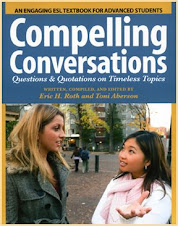Let me enjoy this brief moment of personal satisfaction.
Amazon lists over 5 million books on its website – and continues to overlook many fine self-published books. Naturally, as a self-publisher, Amazon represents an important outlet for my ESL conversation textbook, Compelling Conversations: Questions and Quotations on Timeless Topics. Besides, numbers add precision and ratings can become addictive.
Today Amazon has Compelling Conversations listed at 6,198! That’s my highest overall rating yet – and far better than my usual top 35,000 rating. The book is also rated #3 in the category “adult and continuing education”. Consider me satisfied and surprised.
For a small self-published author, selling a book around the world – and collecting favorable reviews from customers in Australia, Japan, and Spain is a simple pleasure. Amazon’s customer reviews have certainly helped promote the unusual conversation book aimed at sophisticated adults who want to bring their insights, wit and humor into more and deeper English language conversations. Besides my website, www.CompellingConversations.com that offers free sample chapters, Amazon remains my principal promotional tool. So the Amazon ratings and category rankings provide a way to measure success.
Of course, I remain curious about Compelling Conversations finding more success in adult education ESL programs than the flexible private language programs, university programs, and conversation clubs. Private schools, focusing on student desires and needs, usually provide smaller classes with more speaking opportunities. Further, the academic vocabulary appeals more to university bound or university trained adults. Compelling Conversations usually ranks higher in categories like “English as a Second Language”, “English as a Foreign Language”, “Teaching Methods”, “TOEIC”, and even “Quotes” than “Adult and Continuing Education.”
The increasing popularity of Compelling Conversations also reflects a growing awareness that adult education students want and need more speaking opportunities. Adult education programs, sometimes narrowly focused on a so-called life skills curriculum and preparing students for fill-in the blank mandated tests, offer few conversation classes. Why? Mostly because of the funding structure which doesn’t encourage specialized language classes. The large class sizes also limit the chances to speak – even in intermediate and advanced classes. Creative, dedicated adult education teachers have to make exceptional efforts to provide students with speaking skills – and many do so. Compelling Conversations helps busy adult education teachers supplement life skills lessons with energetic conversation activities.
Amazon updates their numbers every hour, and no doubt Compelling Conversations
will soon return to its usual ranking. Reaching the top 10,000 on Amazon may not sound like much to people who reduce all experiences to dollar signs. I made more money teaching Thursday than on my exceptionally successful Friday as a publisher. Yet I’m counting this milestone as a personal victory, counting my blessings, and smiling.
Ask more. Know more. Share more.
Create Compelling Conversations.
Visit www.CompellingConversations.com
Showing posts with label IEP programs. Show all posts
Showing posts with label IEP programs. Show all posts
Saturday, September 27, 2008
Amazon Rates Compelling Conversations #3 in Adult and Continuing Education
Saturday, September 20, 2008
Who ranks ESL programs? How would you choose an English language school?
How would you choose an English language school? What if you lived in Korea, Spain, China, Brazil, Turkey, or Vietnam? What factors would influence your decision? How would you find out the school’s reputation? Who ranks ESL programs? What is their criteria?
Hundreds of thousands of students travel thousands of miles each semester to attend ESL schools. These intensive English language programs, often affiliated at universities, provide an opportunity to study English, live abroad, and prepare for the all-important TOEFL test. Given the importance of English to the business, scientific, and political events, the ability to read, write, and speak English often seems mandatory to ambitious 21st century students.
Yet, like any consumer product, the quality of the schools widely varies. How would a student make a rational choice?
This question emerged as I spoke with several dozen international students this week about their resumes, educational backgrounds, and training in English. While this elite group of mostly graduate students had succeeded in the academic game, several shared stories of unpleasant experiences at language schools. Sometimes students found a huge gap between their expectations and their actual American classroom experiences.
The apparent randomness of significant decisions often surprises me. Normally, I consult friends and established rankings as part of a decision making process. Yet a single thin piece of information, or casual conversation, can easily alter plans. Still I remember systematically searching through numerous guidebooks while selecting my college.
Where can students looking for a quality English language programs abroad find this sort of information? Does TESOL have some list of approved or sanctioned schools? Does somebody else – perhaps even local governments – track the effectiveness of schools? Further, what is their criteria? Where can individuals – students, teachers, parents – get that simple, yet vital bit of information? Is any of this information available in English, instead of the first language?
I would suspect, especially for international students of considerable income, that there would have to be somebody who attempts to grade, evaluate, and rank ESL schools. If I was going to travel to the United States, Australia, or the United Kingdom, I would certainly want to know the quality of the program and teachers. Even I was just going to a local English school or attending a public adult education center, I would still check on the school's reputation. Of course, recruiters provide some information too – often with a twist. Given the potential investment in money and time, I assume that guides must exist – and probably not in English.
The best English language source that I have found, so far, is a site called http://www.eslreview.org/ . It rates schools on a scale of 1-5 on teaching, location, housing services, price-quality relationship, and overall satisfaction. You can find basic information and read student reviews. You can also browse through the course catalog and contact the schools. This website review is a starting point, but not much more. The listings look like they could easily be gamed. They also don’t list school accreditations, average TOEFL scores, or hire staff to inspect the schools. Further, the list doesn’t include some prominent IEP schools in California. So it’s a valuable starting point to compare ESL schools, but it is hardly a Petersen’s Guide to IEP programs.
Does anybody know a better resource in English?
Ask more. Know more. Share more.
Create Compelling Conversations.
Visit www.CompellingConversations.com
Hundreds of thousands of students travel thousands of miles each semester to attend ESL schools. These intensive English language programs, often affiliated at universities, provide an opportunity to study English, live abroad, and prepare for the all-important TOEFL test. Given the importance of English to the business, scientific, and political events, the ability to read, write, and speak English often seems mandatory to ambitious 21st century students.
Yet, like any consumer product, the quality of the schools widely varies. How would a student make a rational choice?
This question emerged as I spoke with several dozen international students this week about their resumes, educational backgrounds, and training in English. While this elite group of mostly graduate students had succeeded in the academic game, several shared stories of unpleasant experiences at language schools. Sometimes students found a huge gap between their expectations and their actual American classroom experiences.
The apparent randomness of significant decisions often surprises me. Normally, I consult friends and established rankings as part of a decision making process. Yet a single thin piece of information, or casual conversation, can easily alter plans. Still I remember systematically searching through numerous guidebooks while selecting my college.
Where can students looking for a quality English language programs abroad find this sort of information? Does TESOL have some list of approved or sanctioned schools? Does somebody else – perhaps even local governments – track the effectiveness of schools? Further, what is their criteria? Where can individuals – students, teachers, parents – get that simple, yet vital bit of information? Is any of this information available in English, instead of the first language?
I would suspect, especially for international students of considerable income, that there would have to be somebody who attempts to grade, evaluate, and rank ESL schools. If I was going to travel to the United States, Australia, or the United Kingdom, I would certainly want to know the quality of the program and teachers. Even I was just going to a local English school or attending a public adult education center, I would still check on the school's reputation. Of course, recruiters provide some information too – often with a twist. Given the potential investment in money and time, I assume that guides must exist – and probably not in English.
The best English language source that I have found, so far, is a site called http://www.eslreview.org/ . It rates schools on a scale of 1-5 on teaching, location, housing services, price-quality relationship, and overall satisfaction. You can find basic information and read student reviews. You can also browse through the course catalog and contact the schools. This website review is a starting point, but not much more. The listings look like they could easily be gamed. They also don’t list school accreditations, average TOEFL scores, or hire staff to inspect the schools. Further, the list doesn’t include some prominent IEP schools in California. So it’s a valuable starting point to compare ESL schools, but it is hardly a Petersen’s Guide to IEP programs.
Does anybody know a better resource in English?
Ask more. Know more. Share more.
Create Compelling Conversations.
Visit www.CompellingConversations.com
Subscribe to:
Posts (Atom)





